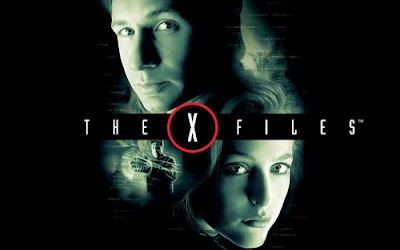 |
| Always something strange in this THIS neighborhood. |
Think
for a moment of your definition of science fiction. I’ll bet you a Romulan ale
the first thing that comes to mind is space,
a starship, and an adventure set
in the
future. That adventure might be dark (dystopia) or hopeful (STAR TREK or
STAR
WARS), but the world you envision
is far, far away from the here and now.
But,
of course, there is nothing in the actual definition of science fiction that requires a
setting in the future or, for that matter, in space. Although my Oxford
American dictionary does say SF is set “typically
in the future” (my emphasis), it also says SF “deals with imagined scientific,
technological or social developments.” Those could happen any time or place, it seems to
me. The whole Steampunk subgenre imagines they happened in an alternate
Victorian era, here on Earth. Alternate histories by authors like Phillip K.
Dick and Harry Turtledove imagine those events happened in a completely
different America and still fit the SF bill.
Mad
scientists like the Dr. Frankenstein of the very first science fiction novel;
Godzilla and his ilk arising from the nuclear testing wastelands of the postwar
Fifties; Batman and Spiderman and Ironman—all qualify as science fiction
without a space ship in sight. And, in fact, much of SF in the Fifties and
Sixties dealt with the effects of science on the humans of Earth, as our
technology outran our good sense in the headlines every day. Stories by authors
Zenna Henderson and Theodore Sturgeon, television shows like THE TWILIGHT ZONE
and THE OUTER LIMITS (and later, THE X-FILES and FRINGE) reflected this Earth-bound
kind of SF. A lot of weird stuff can happen right in our own neighborhoods, as
any fan of Rod Serling can tell you.
 |
| And in this one! Still no space ships unless you count UFOs. |
As
most of you know, I write this kind of “grounded” science fiction romance. In
my Interstellar Rescue universe, the
alien bad guys and others out there have the tech to get around in space,
though this backwater called Earth does not. That makes us Earthers vulnerable
and Earth the nexus of a lot of juicy conflict.
The
problem comes when I try to describe the kind of SFR I write to a world that
deals in “tags” and marketing concepts and simple one-line pitches. I don’t
write “futuristic novels;” I don’t write “time travel;” I don’t write
“dystopia” or “space adventure” (except for Book Three in my series, which
might qualify for that particular tag). I’ve been calling my work “SF suspense
romance,” but that’s a mouthful, and people look at me blankly when I say it. I
tried borrowing Heather Massey’s descriptive “hearth and home” term, but that
didn’t seem to fit, either.
So,
as with Occam’s Razor, the simplest answer is always the best. I’m thinking I
should just call it what it is: Contemporary
SFR, meaning science fiction romance set in the here and now.
Gah!
you say! Doesn’t that lump me in with small towns and coming-back-home stories?
Or maybe big cities and millionaire mystery baby daddy drama? Or, to bring
things completely up-to-date, barely legal kinky sex?
Well,
whoa there, space rangers. First of all, if the term did link me with the
contemporary romance crowd, I wouldn’t complain,’cuz, you know, those readers read A
LOT of books. And straight, laser-shootin’ SFR hasn’t brought in nearly those kinds
of numbers yet.
But
there’s a reason contemporary romance has so many faithful fans: the stories
play to themes of community and family and loyalty to core ideals. They may be
fantasies, as all romances are, but they speak to familiar, and very human,
qualities.
Paranormal
romance has played off these key concepts quite well to attract the same kind
of romance readers. Take J.R. Ward’s wildly successful Black Dagger Brotherhood series, for example. Over and over the
books return to tropes of “fated lovers”, a good woman taming an alpha male,
loyalty to the “family” of the Brotherhood, the small town of Caldwell NY and a
central cast of characters that become known to readers of the series. None of
this is new to contemporary readers. The only thing different is that these
guys aren’t ranchers or small town bad boys. They’re kickass vampires.
I’m
trying to take similar concepts of community, loyalty and core characters and
give them an SFR twist in my Interstellar
Rescue series. The bad guys (and some of the good guys) just happen to be
aliens. And though my heroes and heroines may wander to an alien planet or onto a
starship on occasion, it’s Rescue’s mission to protect Earth. The central focus
of the series always returns home to this planet, in the here and now, where a
close group fights together against a common enemy.
So
now I can say that what I write is contemporary
SFR, both in time and place, but also at heart. It’s short and to the
point. Maybe it’ll catch on.
Cheers,
Donna

I LOVE that tag, Donna. I actually have a couple of CONTEMPORARY SFRs on the back burner now. Who doesn't understand the concept of X-Files or Roswell or other such creations--it's Sci-Fi set in the here and now. Great blog!
ReplyDeleteThanks, Laurie! You know better than most how much I've struggled with this! Remember the Meyer course on pitches? ARRGGH! Sometimes it's easy to overthink these things.:)
DeleteLOL Yes, well pitches have never been my strong point. I think correlating Unchained Memory and Trouble in Mind to the X-Files was a great connect for readers.
DeleteIt's a great tag. Spaceships and science frighten the bejesus out of a lot of people who would love the stories if they'd only try.
ReplyDeleteSo true, Greta! I'm hoping the new tag will create a little SFR-curiosity for folks. I agree, I think they'd love it if they'd only give it a try.
Delete